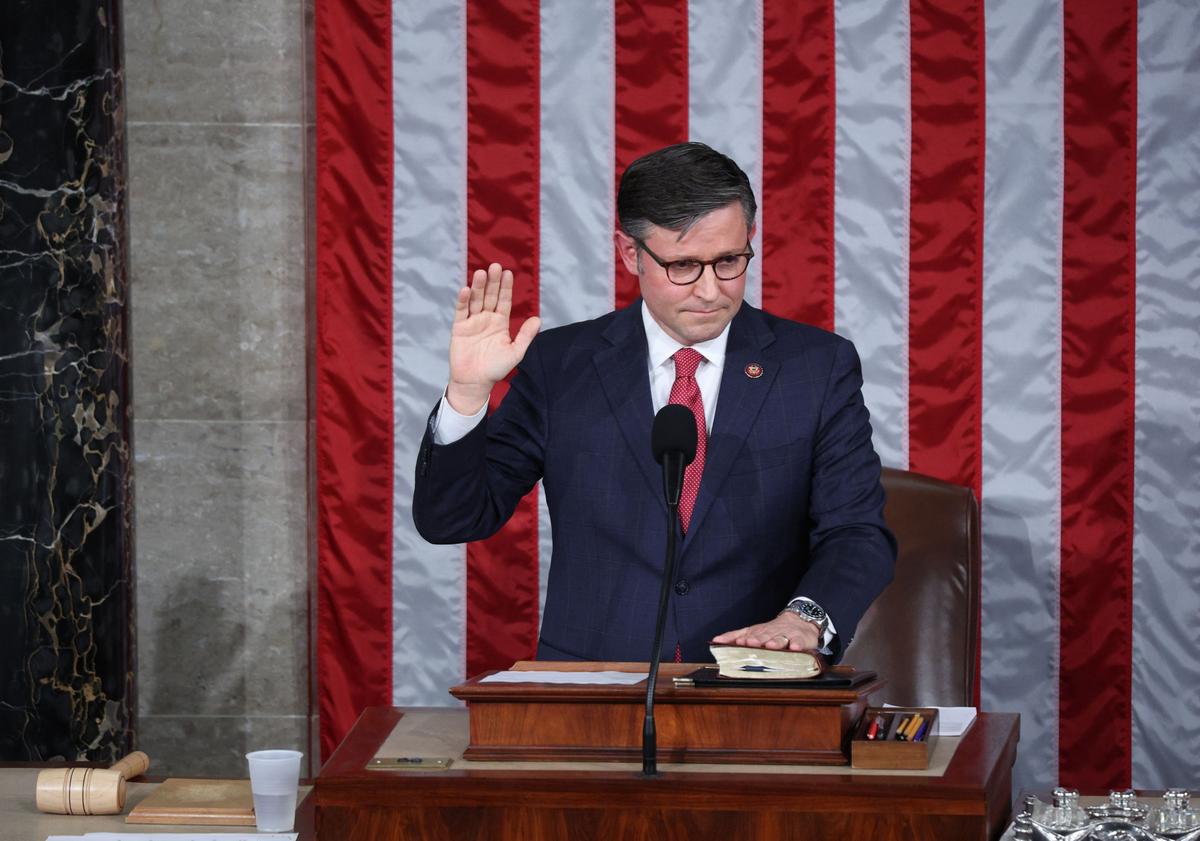
Newly elected House Speaker Mike Johnson (R-La.) is sworn in at the U.S.
Capitol in Washington on Oct. 25, 2023. (Tom Brenner/AFP via Getty
Images)
Rep. Mike Johnson (R-La.) has been elected speaker of the House of Representatives, clearing the way for the chamber to reopen after 22 days of enforced idleness since the ouster of former Speaker Kevin McCarthy (R-Calif.).
He became the 56th speaker of the chamber on Oct. 25, winning 220 votes—including unanimous support from the Republican conference on the first ballot—a stunning moment that capped weeks of tumultuous infighting that saw three other Republican speaker nominees rise and fall.
Making his way to the rostrum amid a standing ovation, Mr. Johnson received handshakes and hugs from colleagues and even posed for a selfie with one member.
Mr. Johnson, carrying what appeared to be a Bible in hand, accepted the gavel. He thanked House Minority Leader Hakeem Jeffries (D-N.Y), as well as his predecessor Mr. McCarthy (R-Calif.) for his service, crediting him with creating the Republican majority in the House.
"I want to say to the American people, on behalf of all of us here, we hear you," Mr. Johnson said at the podium.
"We know the challenges you're facing. We know that there's a lot going on in our country, domestically and abroad, and we're ready to get to work again to solve those problems, and we will. Our mission here is to serve you well, to restore the people's faith in this House, in this great and essential institution."
Drawing on biblical themes, Mr. Johnson said, "I believe that each one of us has a huge responsibility today to use the gifts that God has given us to serve the extraordinary people of this great country as they deserve it and to ensure that our Republic remains standing as the great beacon of light and hope and freedom in a world that desperately needs it."
The new speaker seemed part political philosopher and part policy wonk as he explained his vision for governance and laid out a legislative agenda to address border security, inflation, and the national debt.
"We want our allies around the world to know that this body of lawmakers is reporting again to our duty stations. Let the enemies of freedom around the world hear us loud and clear, the People's House is back in business," he said.
With that, Mr. Johnson was sworn in by the longest-serving member of the House of Representatives, Rep. Hal Rogers (R-Ky.).
The House immediately began a legislative session.
In a whirlwind of activity the previous day, Mr. Johnson was first defeated in a Republican nominating conference but elected less than 10 hours later after Majority Whip Tom Emmer (R-Minn.) withdrew his nomination.
The 51-year-old attorney and former radio host now faces the daunting task of keeping the fractious Republican majority united as it faces a series of near-immediate decisions.
Unanimity at Last
Mr. Johnson received a prolonged standing ovation from fellow Republicans upon his nomination by Conference Chair Elise Stefanik (R-N.Y.)."Today is the day that House Republicans will humbly look in our hearts and elect Mike Johnson as Speaker of the People's House," Ms. Stefanik said, a nod to the desire of many Republicans to put the divisions of the past three weeks behind them.
She described Mr. Johnson as a deeply principled man of faith who was strong, fair, and kind, and able to lead the House in facing the country's significant problems.
"The people are looking to this great chamber to save America, and save America we will," Ms. Stefanik said. "Today is the day we get this done."
Rep. Pete Aguilar (D-Calif.) made a gesture of respect to Speaker Pro Tempore Patrick McHenry (R-N.C.) before nominating Mr. Jeffries.
"I noticed a little bit more of a smile on your face today than we have in the past," Mr. Aguilar said, acknowledging Mr. McHenry's service in a difficult temporary role as it drew to a close. The remark evoked a sheepish smile from Mr. McHenry and a standing ovation for the speaker pro tempore from both sides of the aisle.
Mr. Aguilar went on to cast the speaker election as a partisan battle inspired by the former president.
"This has been about one thing—this has been about who can appease Donald Trump."
Balloting began just before 1 p.m. with 429 members present, including 220 Republicans. The number of votes needed for election was 215. Mr. Johnson was elected 220–209, unanimously supported by fellow Republicans.
As the hour-long voice vote proceeded, Republicans and Democrats traded occasional jeers as several members aimed barbs at the opposing candidate when casting their vote. Mr. McHenry once gaveled the House back to order.
Eventually, the mood lightened among Republicans, who erupted in a cheer as Rep. Steve Womack (R-Ark.) cast the 217th vote in Mr. Johnson's favor.
Support
Republicans reacted to their new speaker with confidence that he's a person of integrity who will change the way the House functions.“I know Mike will keep our majority united as we continue to deliver on the commitments we've made to our constituents,” Mr. Emmer said.
Majority Leader Steve Scalise (R-La.) said: “I've seen a commitment [in Mr. Johnson] ... to things bigger than himself, going back to my days in the statehouse. And when he came to Congress, those same principles followed him.”
“We have a new level of trust with Speaker Johnson that did not exist previously,” Rep. Bob Good (R-Va.) said. “Three weeks from now the American people won't care how long it took to get a speaker. They will care that we've got a conservative leader a man of principle a man of integrity, a man who doesn't represent the swamp of D.C.”
President Joe Biden issued a statement congratulating Mr. Johnson on his election and pledging to find common ground with him wherever possible.
"This is a time for all of us to act responsibly, and to put the good of the American people and the everyday priorities of American families above any partisanship," the president wrote.
Former President Donald Trump, who earlier on Oct. 25 backed Mr. Johnson, also celebrated the new speaker.
The Road Ahead
The first action of the House will be the approval of a nonbinding resolution in support of Israel’s right to self-defense, Mr. Johnson said. The resolution, a symbolic measure, has 425 co-sponsors and will be a quick win for the new speaker.After that, the legislative agenda focuses heavily on the completion of the appropriations process before government funding expires on Nov. 17.
Mr. Johnson said he aims to pass the remaining eight appropriations bills in quick succession, which will allow the House to negotiate with the Democrat-controlled Senate from “a position of strength.” He didn't rule out the passage of a second stopgap spending bill if necessary.
The new speaker has proposed using creative approaches to moving the spending bills quickly, including forcing some bills out of the Appropriations Committee and forming a working group to address problems in the farm bill, which failed in September.
It's unclear how these tactics will be received by House Republicans given that concern about following the “regular order” of the legislative process was a key complaint against the former speaker. Passage of a 45-day stopgap spending measure became the final straw that prompted Mr. McCarthy's removal from the role.
The Johnson agenda includes completing 2025 spending bills by the end of July in order to avoid repeating the end-of-year frenzy over government spending, something fiscal hawks have agitated for. The speaker also said he wouldn't recess the House in August unless all 12 appropriations bills have been approved.
Beyond regular appropriations, President Biden has requested some $105 billion in emergency aid to Ukraine, Israel, allies in the Indo-Pacific, and border security. Republicans are eager to support Israel and strengthen border security, although many are leery of Ukraine aid and believe those requests should be considered individually rather than as a bundle.
The House also is expected to consider imposing additional sanctions on Iranian oil sales in an attempt to reduce their ability to fund terrorist activities.
New Leader, Same Conference
The unanimous vote for Mr. Johnson by House Republicans masks, if only temporarily, the deep divisions that exist within their conference. Over the preceding days, Republicans were more willing to acknowledge that conflict publicly.“I think it is apparent to the American people that the GOP conference is hopelessly divided,” Mr. Womack told reporters on Oct. 24.
Those divisions have been evident in events of the preceding three weeks as a handful of Republican members—not always the same ones—were able to force the conference to abandon the will of the majority.
“First, McCarthy was the one with problems, then Steve Scalise, then Jim Jordan, then Tom Emmer,” Rep. Dusty Johnson (R-S.D.) said. “It may be that Republicans in the House have been conditioned to just say no unless they get everything they want.”
Leading the diverse and often cantankerous conference will be challenging, but some members expressed confidence that Mr. Johnson has the skill for the job.
“I have a lot of respect for his maturity, his judgments, and his personal character," said Rep. Tom Cole (R-Okla.). "And I think those things we'll see if we were just about any challenge."


No comments:
Post a Comment